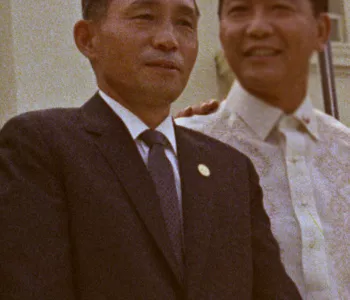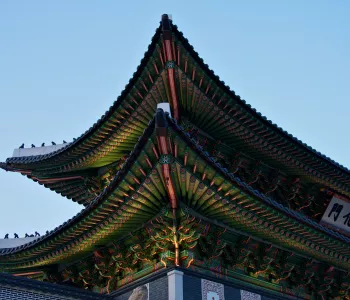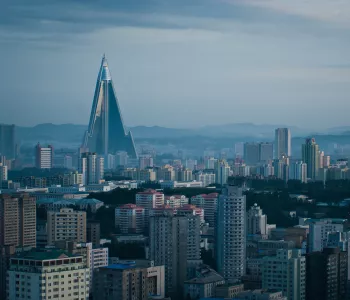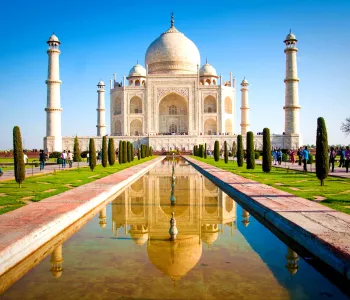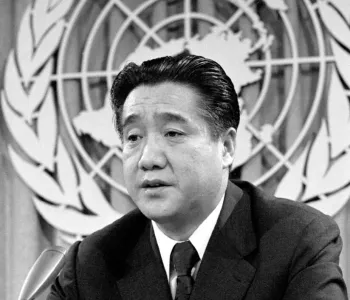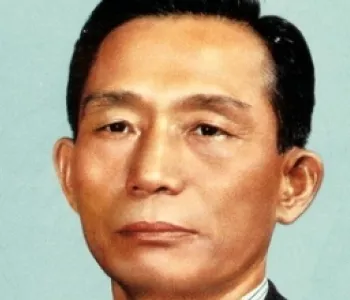d'Vinci

Kim, Jong-pil
A South Korean politician who established the Korean Central Intelligence Agency in 1961 and was Prime Minister during Kim Dae Jung's presidency.

KIM JONG-PIL (1926-). Popularly known as J.P., he was born in Gongju, South Chungcheong Province. After graduating from Seoul National University in 1947, he enrolled at the Korean Military Academy, graduating as a member of the 8th graduating class in 1949. Rising in rank to lieutenant colonel, he served in the Army Headquarters G-2 Intelligence Section, and married a niece of Major General Park Chung Hee. In December 1960, Kim and other rebellious army officers, who had been contemplating a military coup for some time since early 1960, advocated the purification of the army. As a result, he was forced to retire from active military service for his insubordination to his superiors. After that, he became a more determined plotter of a military coup, bringing about the Military Revolution of 16 May 1961.
Following the 1961 military takeover, Kim established the Korean Central Intelligence Agency (now the National Intelligence Service), becoming its first director, and when he and his comrades in arms established the Democratic Republican Party (DRP) in early 1963, he became one of its key leaders. He was elected to the National Assembly in 1963 as chairman of the DRP. Reelected to the National Assembly in 1967, he served as senior adviser to president Park Chung Hee, who was also president of the DRP. Kim himself became vice president of the DRP in 1971.
He served as Park's premier from June 1971 until December 1975. In March 1973, when he and his close associates formed a new political party named the Political Fraternal Society for Revitalizing Reform, Kim became one of its key leaders; Reelected to the National Assembly in 1979, he became the president of the DRP when president Park was assassinated in October.
Following the December 1979 coup, Kim was purged in May 1980, and was often under house arrest. Depurged in 1987, he reconstructed the defunct DRP into the New Democratic Republican Party, becoming its head as well as its presidential candidate. He lost the election in December 1987, but in 1988 he was elected to the National Assembly once again. When the party merged with the Democratic Justice Party and the Reunification Democratic Party, forming the Democratic Liberal Party (DLP) in February 1990, Kim became one of its three supreme leaders.
Kim survived in the leadership of the DLP until early 1995. By then he was party chairman, but he was forced out of this position in January 1995. Undaunted, he proceeded once more to form a new political party, the United Liberal Democrats (ULD), with himself as leader. It claimed to be the only genuine conservative party in South Korea. It enjoyed modest electoral success, with 50 members elected in the 1996 National Assembly elections.
How deep its political convictions were was not clear. In a surprise move, the party joined with Kim Dae-jung's National Congress for New Politics in 1997, in order to contest the presidential election. Despite their long years in opposition to each other, the two Kims agreed that Kim Dae-jung would be the presidential candidate. After his narrow win in 1997, Kim Dae-jung made Kim Jong-pil his prime minister, though not without a great deal of opposition from within his own party. As prime minister, Kim Jong-pil advocated a cabinet system of government, to replace the executive president system. Early in 2000, the coalition broke up, and Kim resigned as prime minister, to contest the April 2000 general election as ULD leader. However, his party did badly in the election, and by May 2000, he was once again in a coalition with Kim Dae-jung.
The election of Roh Moo-hyun as president in 2002, and the passing from the political scene of Kim Dae-jung in 2003 has left only Kim Jong-pil from the era of the "three Kims," as the period since the early 1970s has come to be known. How much longer he can survive as an active politician is now a matter of speculation.
All rights reserved. No portion of this publication may be reproduced, stored in a retrieval system, or transmitted in any form by any means, electronic, mechanical, photocopying, recording or otherwise without the prior written permission of the publisher. (Historical Dictionary of the Republic of Korea, by Andrew C. Nahm and James E. Hoare, published by RLPG Books, appears by permission of the author and publisher).
Following the 1961 military takeover, Kim established the Korean Central Intelligence Agency (now the National Intelligence Service), becoming its first director, and when he and his comrades in arms established the Democratic Republican Party (DRP) in early 1963, he became one of its key leaders. He was elected to the National Assembly in 1963 as chairman of the DRP. Reelected to the National Assembly in 1967, he served as senior adviser to president Park Chung Hee, who was also president of the DRP. Kim himself became vice president of the DRP in 1971.
He served as Park's premier from June 1971 until December 1975. In March 1973, when he and his close associates formed a new political party named the Political Fraternal Society for Revitalizing Reform, Kim became one of its key leaders; Reelected to the National Assembly in 1979, he became the president of the DRP when president Park was assassinated in October.
Following the December 1979 coup, Kim was purged in May 1980, and was often under house arrest. Depurged in 1987, he reconstructed the defunct DRP into the New Democratic Republican Party, becoming its head as well as its presidential candidate. He lost the election in December 1987, but in 1988 he was elected to the National Assembly once again. When the party merged with the Democratic Justice Party and the Reunification Democratic Party, forming the Democratic Liberal Party (DLP) in February 1990, Kim became one of its three supreme leaders.
Kim survived in the leadership of the DLP until early 1995. By then he was party chairman, but he was forced out of this position in January 1995. Undaunted, he proceeded once more to form a new political party, the United Liberal Democrats (ULD), with himself as leader. It claimed to be the only genuine conservative party in South Korea. It enjoyed modest electoral success, with 50 members elected in the 1996 National Assembly elections.
How deep its political convictions were was not clear. In a surprise move, the party joined with Kim Dae-jung's National Congress for New Politics in 1997, in order to contest the presidential election. Despite their long years in opposition to each other, the two Kims agreed that Kim Dae-jung would be the presidential candidate. After his narrow win in 1997, Kim Dae-jung made Kim Jong-pil his prime minister, though not without a great deal of opposition from within his own party. As prime minister, Kim Jong-pil advocated a cabinet system of government, to replace the executive president system. Early in 2000, the coalition broke up, and Kim resigned as prime minister, to contest the April 2000 general election as ULD leader. However, his party did badly in the election, and by May 2000, he was once again in a coalition with Kim Dae-jung.
The election of Roh Moo-hyun as president in 2002, and the passing from the political scene of Kim Dae-jung in 2003 has left only Kim Jong-pil from the era of the "three Kims," as the period since the early 1970s has come to be known. How much longer he can survive as an active politician is now a matter of speculation.
All rights reserved. No portion of this publication may be reproduced, stored in a retrieval system, or transmitted in any form by any means, electronic, mechanical, photocopying, recording or otherwise without the prior written permission of the publisher. (Historical Dictionary of the Republic of Korea, by Andrew C. Nahm and James E. Hoare, published by RLPG Books, appears by permission of the author and publisher).
Connected Conn.
Popular Documents
|
December 12, 1976 |
US Department of State Cable, ROK Nuclear Reprocessing
A heavily redacted report on joint U.S.-Canadian coordination vis-a-vis the South Korean nuclear program. |
